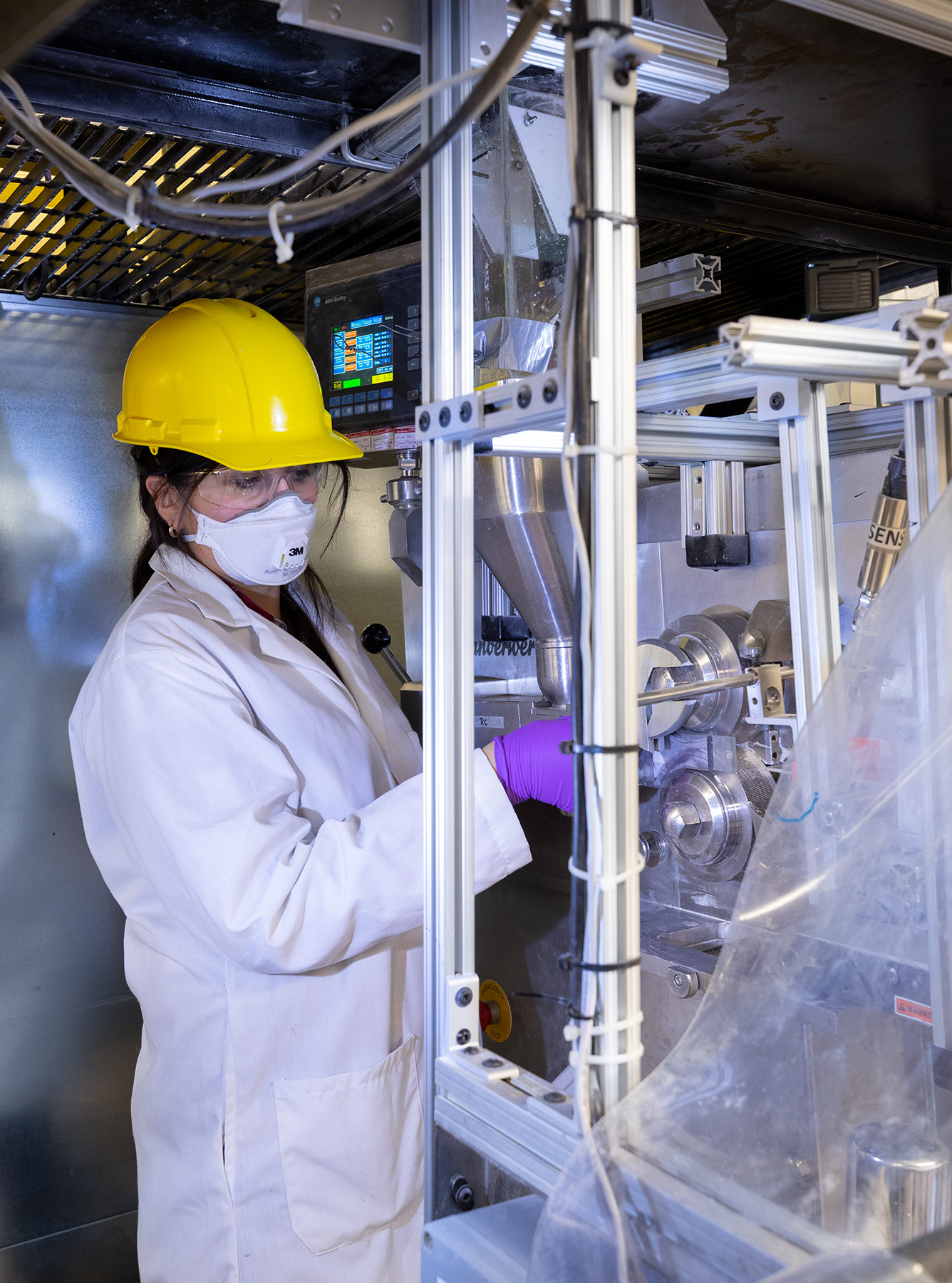Bringing smart technology to pharmaceutical manufacturing
“This is an incredibly complex industry,” said Marcial Gonzalez, assistant professor of Mechanical Engineering. “Not only must pharmaceutical companies be on the cutting edge of manufacturing processes, but they must meet strict regulations from the Food and Drug Administration. Our research tackles both the manufacturing standards and the regulatory standards together.”
Purdue’s solution? Build a complete pharmaceutical manufacturing plant, right here on campus. The Continuous Solids Processing Pilot Plant is built into a high-bay area in the Potter Engineering Center.
 “This is the complete downstream manufacturing of pharmaceutical tablets,” said Gonzalez. “We start with powders that we mix together at a specific ratio, which get compacted into a continuous ribbon and milled into granules. The granules are then lubricated and fed to a tablet press, which creates thousands of tablets an hour. At every step, we have a variety of sensors that measure the quality and consistency of the product and the process.”
“This is the complete downstream manufacturing of pharmaceutical tablets,” said Gonzalez. “We start with powders that we mix together at a specific ratio, which get compacted into a continuous ribbon and milled into granules. The granules are then lubricated and fed to a tablet press, which creates thousands of tablets an hour. At every step, we have a variety of sensors that measure the quality and consistency of the product and the process.”
“We’re one of only two schools in the country that have anything like this,” said Gonzalez.
This facility is the centerpiece of a new $3.95 million grant from the Food and Drug Administration (FDA). The project aims to bring “Industry 4.0” standards to continuous pharmaceutical processes.
“We’ve made great strides in applying process analytical technology, model predictive control and information technology to the pharmaceutical industry,” said Gonzalez. “That’s ‘Industry 3.0.’ This grant will take it a step further to ‘Industry 4.0,’ and enable smart manufacturing processes in the entire supply chain. The machines that are making these tablets will know instantly if there is an issue at any step in the process, and be able to correct problems autonomously, so the downstream product always meets quality specifications.”
The project also includes a regulatory component. “The FDA needs to be able to regulate these products,” said Gonzalez. “So as the manufacturing technology advances, we are working hand-in-hand with both pharmaceutical companies and the FDA to address how they can efficiently monitor the process.”
There are many challenges in manufacturing pharmaceutical products, but Gonzalez says that tough problems are the ones that need to be tackled. “Purdue brings a unique expertise to this field,” he said. “We know how particulate products behave, and we know how to manufacture them. This research will help not just the companies involved, but also the end users. For many of them, getting dependable products at a reasonable price will literally save lives.”
Gonzalez’ co-principal investigators at Purdue are Zoltan Nagy, professor of Chemical Engineering; and Gintaras V. (Rex) Reklaitis, the Burton and Kathryn Gedge Distinguished Professor of Chemical Engineering. Their plant is part of the Center for Particulate Products and Processes (CP3), one of ten Pre-Eminent Teams at Purdue University’s College of Engineering. The FDA grant recipients are members of the Center for Structured Organic Particulate Systems (CSOPS), a coalition of Rutgers University, Purdue University, New Jersey Institute of Technology, and Universidad de Puerto Rico.
Center for Particulate Products and Processes (CP3): http://engineering.purdue.edu/CP3
LinkedIn: https://www.linkedin.com/company/purdue-cp3/
Writer: Jared Pike, 765-496-0374, jaredpike@purdue.edu
Source: Marcial Gonzalez, 765-494-0904, marcial-gonzalez@purdue.edu
